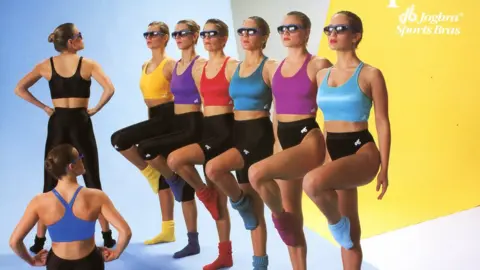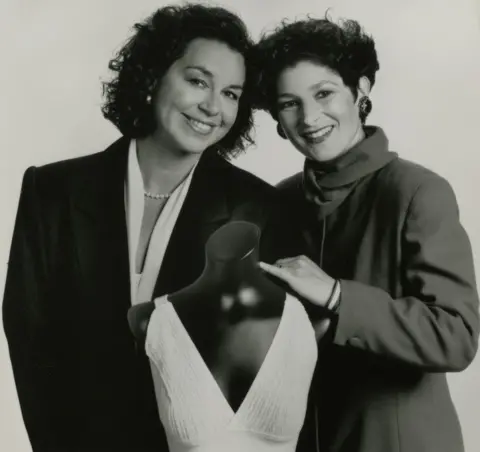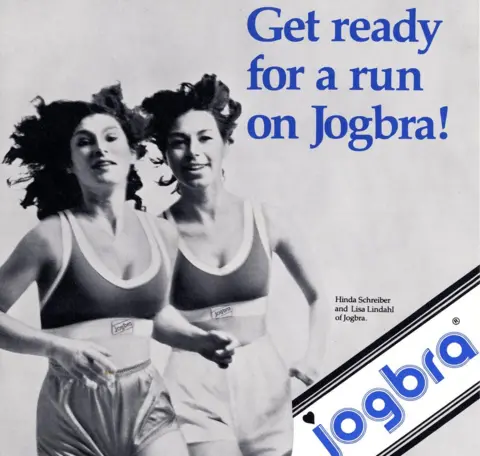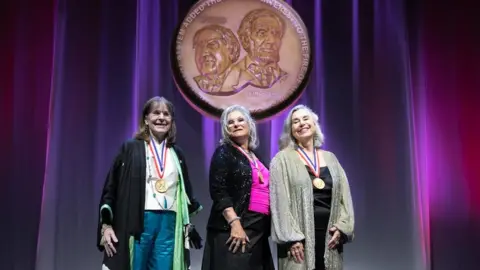The 'jockstrap' that revolutionised women's sports
 Jogbra, Inc. Records, Archives Center, National Mu
Jogbra, Inc. Records, Archives Center, National MuThe modern day sports bra began life as a jockstrap.
It was the summer of 1977 and Lisa Lindahl, a University of Vermont graduate student, was swept up in the running boom, jogging 30 miles every week.
The running was straightforward. Her underwear was not.
"The only uncomfortable part was no adequate breast support," she said.
Lindahl, then 28, tried binding herself with an elastic bandage, and going braless, before eventually settling on a regular bra, one size too small. The struggle for chest support fed a running joke with her sister: why isn't there a jockstrap for women?
But, as the admission of Lindahl and her two co-inventors to the US National Inventors Hall of Fame proves, the sports bra was a serious innovation. And it came amid a revolution in women's sport.
 Jogbra, Inc. Records, Archives Center, National Mu
Jogbra, Inc. Records, Archives Center, National MuLindahl started to take the idea seriously early on. She enlisted her best friend, Polly Palmer Smith, who was working as a costume designer for a Shakespeare Festival in Burlington, Vermont. They were soon joined by Hinda Miller, also a costume designer, and Smith's assistant that summer.
The women set up shop in Lindahl's living room, playing with fabrics and fits. Miller would craft a prototype, and Lindahl would go for a run in it and see how much she "bounced".
"Nothing was working," she said.
That was, until Lindahl's husband came down the stairs with a jockstrap pulled around his chest, presenting the women with their "jock bra".
According to Smith, "it was the lightbulb moment". She sewed two jockstraps together and the first Jogbra prototype was born.
Once the three women had a working design - crossed straps and seams on the outside - they filed a patent and started Jogbra Inc.

Five years before Lindahl, Smith and Miller put together the first versions of the Jogbra, Congress passed Title IX.
The landmark civil rights law barred sex-based discrimination in education, and all other programmes receiving federal funding. Today, two in five girls play a sport, up from one in 27 in 1970, according to the Women's Sports Foundation.
If Title IX made it possible for women to enter sports, the sports bra made it comfortable.
"With Title IX, the money was there, the infrastructure was there and the expectation was there," Lindahl said. "But women were still lacking the confidence and comfort to go on the field and play the sport."
 Jogbra, Inc. Records, Archives Center, National Mu
Jogbra, Inc. Records, Archives Center, National MuToday, the sports bra is seen as revolutionary, credited with bringing that "comfort and confidence" to female athletes. It's also a $9bn (£7.3bn) industry - a figure that's expected to grow four times over by 2026. The wider 'athleisure' market is $25bn and also booming.
But in 1977, as Jogbra was being developed, it was a different story.
It had only been five years since the Amateur Athletic Union, then the governing body for marathons in the United States, lifted its ban on women's participation in distance road running. And it would take another seven years before women were allowed to run more than 3,000m in the Olympics, thanks to experts' claims that distance running was harmful to their health and femininity.
Shortly after the company's inception, Smith returned to New York City to join the Jim Henson Company as a costume designer, leaving control of Jogbra Inc to Lindhal and Miller.
Using a $5,000 loan from Miller's father, the two women commissioned the first 60-dozen batch of Jogbras and began approaching sports stores. Their product was a piece of sports equipment, not lingerie, Miller said.
But speaking to store owners and managers - mostly male - "we would be laughed out," Lindahl said. "Almost every time they'd say 'we don't sell bras in our store.'"
So they tried another route, approaching the assistant store managers - mostly female - and giving them a Jogbra sample to try.
They packaged the Jogbra in a subtle black box and swapped out the complex cup sizing of regular bras for a more simple small, medium and large.
It worked. The very first Jogbra hit the market in 1978, priced at $16 a piece.
They started to put out ads in running magazines with Lindahl and Miller acting as models, as they couldn't afford anyone else. Their slogan was: "No man-made sporting bra can touch it."
Miller included the line 'dealer inquiries invited' on the adverts. "I didn't really know what that meant… but then they started calling..." she said.
"...My home phone," Lindahl added, laughing.
They quickly sold out that first run of bras. By the end of their first year in business, Lindahl and Miller had about $500,000 in sales and a profitable company.
They saw rapid growth - about 25% per year for the next decade - but faced a steep learning curve. Lindahl recalled a confusing message from a sales representative who said he wanted to work with them.
"I didn't even know what a 'rep' was," she said.
While Lindahl looked after sales and marketing, Miller was in charge of production and inventory. They hired roughly 200 employees, moved manufacturing to Puerto Rico and expanded their Jogbra line to include the SportShape bra for large-breasted women and a bra-top to cover women's stomachs.
 National Inventors Hall of Fame
National Inventors Hall of FameBut as Jogbra Inc soared, the relationship between the company's leaders deteriorated.
The two women clashed constantly, growing their company "screaming and yelling all the way", Lindhal said.
Then, by the late 1980s, Jogbra Inc's own success began to slow, and competition from companies like Nike and Reebok meant they'd need to take on significant debt to keep up.
In 1990, they sold Jogbra Inc to Playtex for an undisclosed amount.
"We sold it at a time when we felt that we had so much burnout, so much strife within our leadership team," Miller said.
Today, the old scars have faded.
"We're all in our 70s, and we're all alive, we can just smile about it. We wanted the Jogbra on as many people as possible and we did that, we made it through," said Miller.
When they were inducted into the National Inventors Hall of Fame in Washington DC, last week, alongside the creators of laser dermatology, ibuprofen, and voice-over-internet technology, they could still hardly believe it.
"When we saw the list with all the other inventors we thought, 'We'll just tell them we invented Post-its [sticky notes].' We just didn't feel as serious," Smith said.
"The organisers told us: 'You can't do that - the Post-it people will be there.'"
But all three founders say they still get excited seeing women in sports bras - with most still bearing loose resemblance to those two jockstraps sewed together.
"It's pride and amusement when I see them," Smith said. "Like 'hey, I made that.'"
